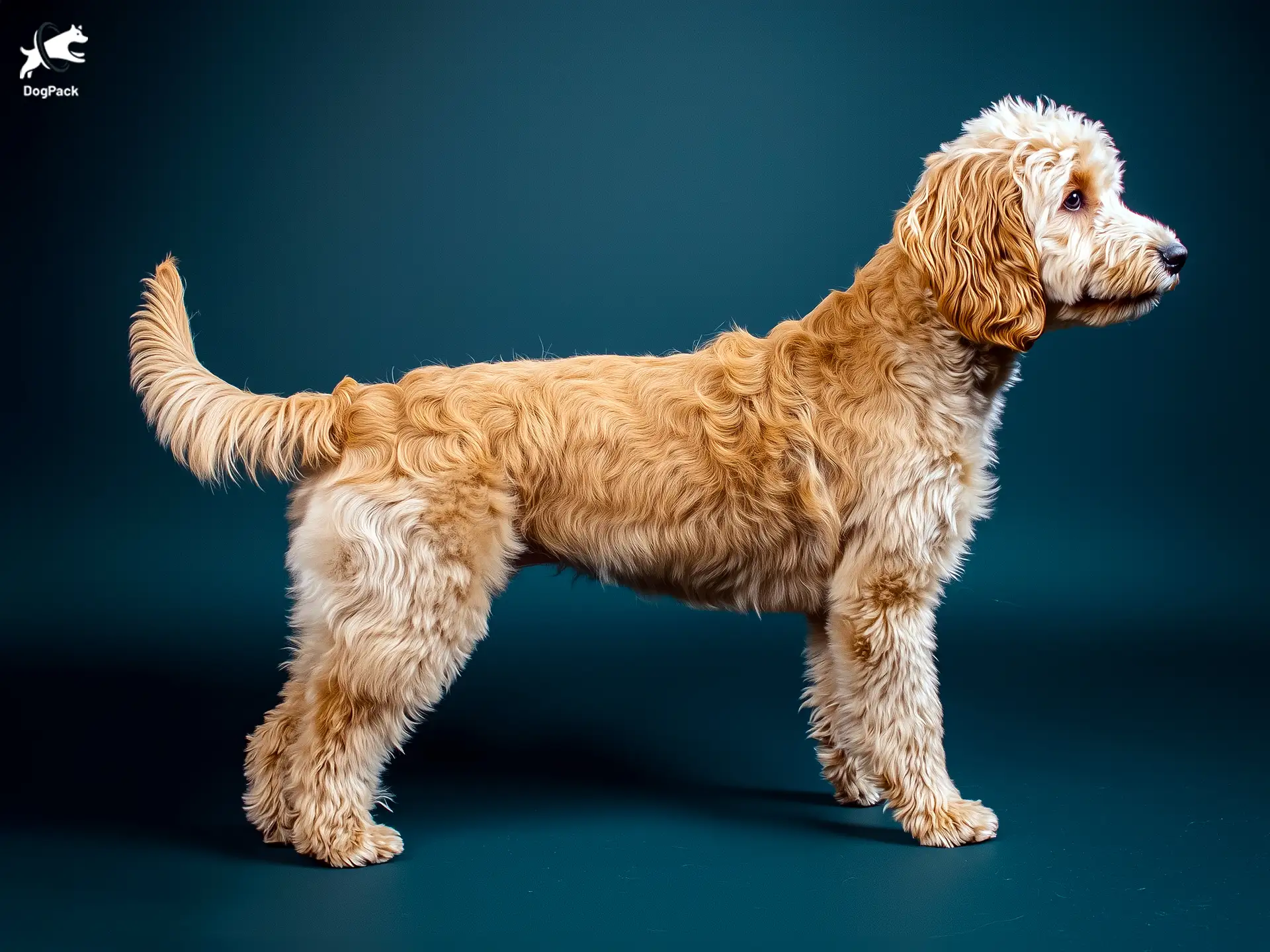Groodle Dog Breed Info & Overview
The Groodle, also known as the Goldendoodle, is a delightful mix of Golden Retriever and Poodle. Celebrated for their friendly nature and low-shedding coats, Groodles are perfect companions for active individuals and families alike. Combining intelligence, affection, and unwavering loyalty, this breed thrives in loving homes and brings endless joy to any household lucky enough to welcome one.
Characteristics
Pictures
Breed History
Groodles trace their roots back to the early 1990s, when breeders wanted to combine the Golden Retriever’s gentle nature with the Poodle’s hypoallergenic coat. Although Goldendoodles first gained traction in North America, Australia was quick to embrace the concept of crossing these two popular breeds. Initially, the main goal was to create a sociable companion dog that would also be kinder on allergy sufferers.
As word spread about this lovable hybrid, families and therapy dog programs began to notice their calm temperament and trainable disposition. Over time, Groodles earned a reputation as wonderful emotional support animals, excelling in hospital visits and nursing homes. Their history of working alongside people showcased their affectionate spirit, which further fueled the breed’s rapid rise in popularity across several continents.
Although not officially recognized by major kennel clubs in the same way as purebred dogs, the Groodle has cemented its status as a beloved designer breed. Some fans prefer the term “Goldendoodle,” while others stick with “Groodle,” especially in Australia. No matter which name you use, this breed’s history is grounded in the desire to create a friendly, low-shedding companion that blends two beloved dog lineages.
Temperament, Personality
If you’ve ever met a dog that greets everyone like a long-lost friend, chances are it was a Groodle. These dogs radiate friendliness, happily wagging their tails at strangers and family members alike. They’re often described as eager to please, which makes them adaptable to various social settings. Whether they’re tagging along on a picnic or snuggling at home, they keep spirits high.
In many cases, Groodles bond closely with their families, forming deep attachments that can turn them into shadow dogs—always at your side, often peering up at you with inquisitive brown eyes. With children, they show patience and gentle play, making them a popular choice among households craving a dependable, affectionate companion. Early socialization ensures they remain comfortable around visitors and other pets.
Despite their warmth, it’s important to remember these dogs can become anxious if left alone for extended periods. They thrive on human interaction and do best in environments where someone is regularly around. Introduce them to different people, places, and experiences early in life to keep that sweet temperament intact. A Groodle’s loving nature generally makes them an ideal choice for those seeking a sociable, people-oriented pet.
Physical Characteristics
A Groodle’s appearance often depends on whether they inherit more traits from the Poodle or the Golden Retriever side. Many sport wavy to curly coats, typically soft to the touch. Some have a rounder “teddy bear” face, especially if the Poodle influence is stronger, while others show the more elongated muzzle of a Golden Retriever, but generally maintain a balanced, endearing expression.
In terms of build, these dogs range from medium to large, with well-proportioned bodies that reflect their energetic nature. Their eyes, usually dark or hazel, exude a warm and friendly expression. The ears hang down, framing the face and contributing to their cuddly, approachable aura. While coat colors can vary, shades of gold, cream, and apricot tend to be the most common.
Those signature low-shedding coats can be a major selling point for individuals with allergies. However, the level of curl and dander can differ from puppy to puppy, so prospective owners should be prepared for a range of coat types. Overall, the Groodle’s physical traits make it immediately recognizable among large dog breeds, especially when sporting that trademark fluffy, almost plush-like appearance.
Health Issues
Like any crossbreed, Groodles can inherit genetic conditions from either parental line. Hip and elbow dysplasia, which can affect Golden Retrievers, might appear, leading to discomfort or mobility issues. Regular checkups and early screening with a trusted vet can catch potential problems before they escalate. Proper weight management also plays a critical role in easing any strain on joints.
Eye conditions, such as progressive retinal atrophy, can sometimes occur in this mix, especially if not monitored. Additionally, Poodles can pass along predispositions to certain skin problems or ear infections due to their floppy ears retaining moisture. Keeping the ears clean and dry is essential to prevent bacteria buildup. On the positive side, mixing the gene pools often reduces the likelihood of breed-specific illnesses.
Consulting reputable sources, like the Orthopedic Foundation for Animals and your vet, is beneficial to understand risk factors and recommended testing. Beyond genetics, a consistent grooming schedule, balanced diet, and regular exercise all contribute to robust health. With attentive owners and routine vet visits, a Groodle can enjoy a long, happy life that easily stretches into its teenage years.
Grooming Needs
One of the major appeals of a Groodle is its low-shedding coat, but “low-shedding” doesn’t always mean “low-maintenance.” Wavy or curly fur can easily mat if left unchecked. Brushing at least two to three times a week—especially around the ears, tail, and belly—helps prevent knots and tangles. Some owners find a steel comb and slicker brush combo particularly effective.
Professional grooming every six to eight weeks keeps your dog’s coat healthy and trim. A longer cut requires more diligent at-home care, while a shorter clip is easier to manage between visits. Bathing should happen as needed—too frequent washes strip their natural oils, while neglect can cause odor or skin issues. A monthly nail trim is also recommended to keep those paws in tip-top shape.
Part of the grooming routine involves checking ears for signs of redness or odor and gently cleaning them with vet-approved solutions. Many owners also invest in high-quality shampoos designed for dogs with sensitive skin, as Poodle crosses can be prone to dryness. Ultimately, a consistent grooming regimen keeps a Groodle comfortable and ensures that their signature fluffy coat stays soft and free of tangles.
Exercise Requirements
A Groodle is not a couch potato; these dogs have a zest for life and thrive on activity. Aim for at least one to two hours of exercise daily, which can include brisk walks, playtime in a fenced yard, or interactive games like fetch. They appreciate variety, so mixing up jogging, swimming, and puzzle toys is a fantastic way to keep them mentally and physically engaged.
An energetic dog that lacks sufficient activity can develop bored or anxious behaviors, such as excessive barking or chewing. Fortunately, these pups are happy to participate in family adventures. Some owners enjoy taking them on hikes or day trips to dog-friendly parks. Keep in mind that Groodles can be enthusiastic swimmers, a trait inherited from both the Golden Retriever and Poodle sides.
If you have a busy schedule, consider short training sessions combined with quick outdoor romps to break up the day. Doggy daycare services might also be an option to give your pet the social and physical stimulation they crave. Whether it’s a fun backyard agility course or a routine walk around the block, ensuring your Groodle gets enough exercise will result in a calmer, happier companion.
Training Tips
Given their Golden Retriever lineage, Groodles are known for their eagerness to please, making training generally straightforward. They respond well to positive reinforcement techniques like praise, treats, and play. Harsh corrections are counterproductive, as these sensitive dogs may shut down or become wary. Short, focused sessions that hold their attention typically yield better results than prolonged drills.
Early obedience classes and socialization set them up for success, ensuring they grow into calm, well-adjusted adults. This breed often excels in trick training, as they love to learn new commands and show off for friends and family. Many Groodles also perform admirably in canine sports like rally and agility. Keeping their minds active through puzzle toys or interactive games helps reinforce good behavior.
Make training sessions fun by sprinkling in a bit of play between commands. For instance, reward a perfectly executed “sit” with a round of tug or fetch. Being patient and consistent goes a long way, especially if you’re a first-time dog owner. If you’re searching for tips specific to medium dog breeds or large dog breeds, this mix generally sits in the sweet spot of cooperative training ease.
Nutrition, Diet
A balanced diet is crucial for a Groodle, which tends to have a hearty appetite. Aim for a high-quality kibble formulated specifically for large, active breeds that features real meat as the primary ingredient. Look for formulas enriched with omega-3 fatty acids to support joint health and a shiny coat, as this cross can be prone to joint issues and dry skin if undernourished.
Puppies often do best on portioned meals multiple times a day—around three servings—so they receive steady nutrients without overloading their developing systems. As they transition into adulthood (usually around 12-15 months), two meals per day may suffice. Monitor your dog’s weight and adjust portion sizes if you notice any unexplained weight gain or lethargy. Some owners add fish oil supplements for extra coat and joint support.
Many Groodles hover between 50 and 75 pounds, so a typical adult might eat roughly 2.5 to 3.5 cups of large-breed kibble daily, divided into two meals. However, activity level and metabolism vary, so consult your vet for a tailored plan. Avoid overfeeding to prevent obesity, which can exacerbate joint problems. Fresh water should always be available to keep your dog hydrated and happy.
Adoption, Breeders
If you’re considering a Groodle, start by reaching out to established breeders who can provide health clearances, lineage details, and insights into each puppy’s temperament. Reputable breeders screen for hip and elbow dysplasia, eye issues, and other genetic concerns. Visiting the facility is ideal, letting you see how the dogs are raised and how they interact with humans and other animals.
For those who prefer adoption, local shelters sometimes have Groodle mixes in need of a second chance. Rescue groups dedicated to mixed or designer breeds can also be a great resource. Websites like Petfinder or Adopt-a-Pet frequently list Groodles looking for forever homes. Adoption counselors can often match you with a dog that suits your lifestyle and energy level.
Whether you choose a puppy or an older dog, proper introductions and consistent routines are key to helping your new pet settle in. Spend time learning about the dog’s background and be patient as they adjust to their new family. Above all, ensure that any breeder or rescue representative you work with is transparent and genuinely cares about the well-being of this loving breed.
Family Pet?
Groodles are fantastic family dogs, often taking on the role of friendly playmate for children. Their easygoing temperament means they adapt to active households, running joyfully alongside kids in the yard or snoozing contentedly by the sofa. They’re typically gentle during rough-and-tumble play, though supervision is always wise to teach children respectful boundaries for any dog.
In multi-pet homes, Groodles often fit right in with other furry friends, including cats—especially if introduced early. They rarely display aggression, preferring instead to coax feline companions or smaller dogs into a game of chase. However, their size and energy might initially be overwhelming to timid animals, so controlled introductions help smooth the transition into a harmonious living arrangement.
Families who love to travel or enjoy weekend adventures find these dogs to be enthusiastic tag-alongs. Just be sure to pack enough treats and water, as Groodles do require regular pit stops to stretch their legs. Thanks to their social nature, they’re happiest when included in family activities. If you’re seeking a companion that can keep up with everyone’s energy, a Groodle fits the bill.
Right For You?
Determining if a Groodle is right for you starts with assessing your lifestyle. Do you have enough time to provide daily exercise, grooming, and social interaction? These dogs thrive in households with people who enjoy outdoor activities and can commit to consistent training. If you’d rather lounge for hours without interruption, consider a more independent breed—Groodles rarely say no to human company.
Apartment living can work, provided you dedicate enough time for walks and mental stimulation. However, a fenced yard offers a bonus space for them to romp around freely. Since they bond closely with their families, leaving them alone for extended periods may lead to anxiety or destructive behavior. Ultimately, potential owners who value a bright, affectionate companion will find a Groodle to be a perfect match.
Before bringing one home, talk to existing Groodle owners, join online forums, or even volunteer at a local rescue to understand their day-to-day needs. These dogs flourish when they feel included in all aspects of family life. If you’re prepared for an outgoing, sometimes goofy partner in crime that demands ample love and attention, you’ll likely adore living with this playful hybrid.
Conclusion
With its sociable nature and endearing fluff, a Groodle can quickly become the heart of a household. Active families and devoted owners who enjoy training and exercise often find that this gentle cross fits seamlessly into their routines. If you’re willing to keep up with grooming, maintain a healthy diet plan, and shower them with attention, you’ll gain a loyal, fun-loving companion for years to come.
FAQs
-
Can Groodles adapt to homes with allergy sufferers?
Yes, Groodles are often recommended for allergy sufferers due to their low-shedding coats inherited from the Poodle parent. However, allergen levels can vary by individual dog, so spending time with a Groodle before adopting is advised.
-
How do Groodles typically behave in water?
Groodles usually love water, thanks to their Golden Retriever lineage. They enjoy swimming and water games, making them ideal companions for families who enjoy outdoor activities near lakes or beaches.
-
Are Groodles suitable for therapy or emotional support roles?
Absolutely, Groodles excel as therapy and emotional support animals due to their gentle nature, intelligence, and eagerness to connect with people. Their calming demeanor makes them ideal for hospitals, schools, and homes.
-
Do Groodles vary significantly in size?
Yes, Groodles come in a range of sizes—miniature, medium, and standard—depending on the size of the Poodle parent. This variety allows families to select a size that suits their living space and lifestyle.
-
How does the Groodle’s coat type affect grooming needs?
Groodles may have curly, wavy, or straight coats, which influence grooming requirements. Curly coats need frequent brushing to prevent matting, while straighter coats may shed slightly more but require less intensive upkeep. Regular trims help maintain coat health.
Breed Ratings
Groodles excel at learning commands and adapting to new situations, thanks to their Retriever and Poodle lineage.
Spirited and always ready for a game, they’ll chase balls and romp around with family members at any opportunity.
They enjoy active lifestyles and need regular exercise, though they can relax at home once they’ve had their fill of fun.
Low to moderate shedding thanks to Poodle genes, but grooming is necessary to prevent matting.
While they may chase small creatures occasionally, they’re generally not driven to hunt relentlessly.
Curly or wavy coats require regular brushing and professional trims to keep them looking their best.
Eager to please and highly intelligent, they excel in obedience, trick training, and agility sports.
These social dogs dislike isolation for long periods and may develop anxiety without companionship.
They’re not excessively vocal but will alert you to unfamiliar sights and sounds.
You might see some drool when they’re excited or after drinking, but it’s usually minimal.
Typically very social with other dogs, they enjoy group play and canine companionship.
Overall robust, though genetic testing and regular vet visits are important to catch potential issues early.













